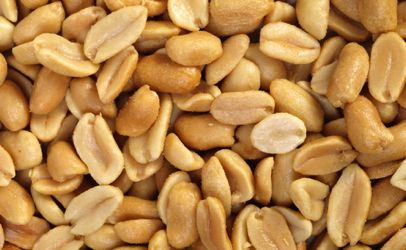Eating the skinless inner kernels of peanuts may improve a person’s gut biota and its ability to ward off E. coli and Salmonella, according to a new study by researchers at the University of Maryland published in the Journal of Food Science. The findings suggest that skinless peanuts could be a beneficial promoter of gut bacteria that will outcompete pathogenic foodborne bacteria and reduce individual risk of illness. As a result, people with vulnerable gut conditions may benefit from eating skinless peanut kernels for their prebiotic-like effects.  Why only peanuts without the skin? Interestingly, the team found that the thin, brown peanut skins had an opposite effect on gut microbes, inhibiting the growth of beneficial microbes (and harmful Listeria monocytogenes) while promoting the growth of E. coli and Salmonella. The idea to study peanuts for their effect on bacteria was inspired by high-profile Salmonella outbreaks in recent years linked to peanut butter, said Debabrata Biswas, Ph.D., co-author of the study and assistant professor at the University of Maryland’s Department of Animal and Avian Sciences. The study’s designer, Mengfei Peng, studied the effects of peanut flour (made from the kernel) and peanut skin extract on three probiotic strains of Lactobacillus alongside the three harmful foodborne pathogens. The peanut flour contributed to the healthy growth of Lactobacillus casei, which outcompetes harmful pathogens by both occupying space on intestinal walls and by producing antimicrobial metabolites to exclude pathogens. In the presence of peanut flour, E. coli growth saw a nearly 10 times reduction (1 log) in colony-forming units after 48 hours. With peanut skin extract, Listeria growth saw more than a 10 times reduction (1 log) in just 24 hours. However, peanut skin extract also significantly reduced the growth of Lactobacillus, which in turn allowed for improved growth of E. coli and Salmonella. The researchers point out in their paper that peanut skins are classified as a Generally Recognized as Safe (GRAS) product. However, no previous studies have looked at the potentially antimicrobial characteristics of peanut skins against beneficial bacteria such as Lactobacillus. Next, the team plans to look deeper into the growth of Lactobacillus in the presence of peanut flour and peanut skin extract. More research is especially needed on peanut skins, Biswas said. The research may prove especially valuable as strains of foodborne pathogens continue to develop resistance to antibiotic drugs, with healthcare research shifting more focus to using natural solutions in the food system to combat foodborne illness.
Why only peanuts without the skin? Interestingly, the team found that the thin, brown peanut skins had an opposite effect on gut microbes, inhibiting the growth of beneficial microbes (and harmful Listeria monocytogenes) while promoting the growth of E. coli and Salmonella. The idea to study peanuts for their effect on bacteria was inspired by high-profile Salmonella outbreaks in recent years linked to peanut butter, said Debabrata Biswas, Ph.D., co-author of the study and assistant professor at the University of Maryland’s Department of Animal and Avian Sciences. The study’s designer, Mengfei Peng, studied the effects of peanut flour (made from the kernel) and peanut skin extract on three probiotic strains of Lactobacillus alongside the three harmful foodborne pathogens. The peanut flour contributed to the healthy growth of Lactobacillus casei, which outcompetes harmful pathogens by both occupying space on intestinal walls and by producing antimicrobial metabolites to exclude pathogens. In the presence of peanut flour, E. coli growth saw a nearly 10 times reduction (1 log) in colony-forming units after 48 hours. With peanut skin extract, Listeria growth saw more than a 10 times reduction (1 log) in just 24 hours. However, peanut skin extract also significantly reduced the growth of Lactobacillus, which in turn allowed for improved growth of E. coli and Salmonella. The researchers point out in their paper that peanut skins are classified as a Generally Recognized as Safe (GRAS) product. However, no previous studies have looked at the potentially antimicrobial characteristics of peanut skins against beneficial bacteria such as Lactobacillus. Next, the team plans to look deeper into the growth of Lactobacillus in the presence of peanut flour and peanut skin extract. More research is especially needed on peanut skins, Biswas said. The research may prove especially valuable as strains of foodborne pathogens continue to develop resistance to antibiotic drugs, with healthcare research shifting more focus to using natural solutions in the food system to combat foodborne illness.
Sponsored by Marler Clark
